About This Series
Wander, Wonder, Write is a reflective travel memoir chronicling a once-in-a-lifetime journey across East Asia between a father and his 13-year-old daughter. More than just a record of places visited, it is a meditation on presence, uncertainty, growth, and the quiet magic of shared experience. What began as a logistical adventure through military flights and foreign cities evolved into something far deeper: a mirror held up to a life in transition, and a heartfelt exploration of what it means to be a parent, a person, and a steward of one’s own story.
This final entry marks the close of that journey—for now.
Suffering ceases to be suffering at the moment it finds a meaning. -Viktor Frankl
I have three degrees. All of them are in Psychology.
I’m not a practicing clinical psychologist today, but I’ve spent many hours in supervised training. I’ve also read an enormous number of books on Psychology—some for coursework, others just because I’m a run-of-the-mill, middle-aged guy trying to navigate parenting, relationships, and my own tangled insecurities.
One of my favorite authors of all time is Viktor Frankl.
Viktor was a Polish psychiatrist in the first half of the 20th century, and his writing has always struck a chord with me. Yes, it’s well-written and intellectually accessible. But more than anything, Frankl has something most psychiatrists lack:
Credibility.
See, Frankl wasn’t just a thinker. He was a survivor.
He was a Jew who lived through the Holocaust—four years in Auschwitz and other concentration camps. His wife and brother were sent to other camps, where both died. His parents were gassed in Auschwitz while he was there, unaware. He didn’t find out he had no one left until after the war.
So when Viktor has something to say about resilience—about what it means to endure—I sit up and listen.
That might seem a tad dark way to start a dad-daughter travelogue, but hear me out.
Where We’ve Been
For two weeks, my daughter and I traversed continents—eating, singing, and dancing our way across the Pacific. And we had a great time. We studied culture. We practiced languages. We explored world history through temples and street art. This was education in its purest form: alive, unscripted, and powered by curiosity.
The trip was everything we had hoped for.
But when it was time to come home, our trip took on a new tenor.
For those who didn’t read the earlier parts of this series, we’re flying Space Available—aka Space-A—on military aircraft, essentially hitching a ride in the cargo hold whenever there’s room. The upside? We can fly for free, which is how we managed to get from Washington, D.C. to South Korea for under $500. The downside… well, we’re entirely at the mercy of whatever the U.S. Air Force decides to do with its planes. Also, commercial flights home from over here are not just expensive—they are prohibitively so.
When we checked in for what was supposed to be our sure-thing home, our first few flights were cancelled—last minute. When we showed up the next day, not only was that flight cancelled, but there were no flights for the next two days.
Okay. We said. A few extra days in Tokyo. Great!
But when this happened not once, not twice, but three more times, we began to wonder if we were doing something wrong.
Like—how can all these missions be cancelled?
No worries. We kept trying. Kept searching for options. Eventually, we flew from mainland Japan to the island of Okinawa, where there were supposedly more frequent flights heading to the U.S.
But the pattern didn’t stop.
Each morning, we awoke to find what felt like a sure thing suddenly disappear. One day, there were four flights to the U.S. on the next day’s schedule, with plenty of available seats. Certainly we would be able to get on one of them. The next morning—gone. All of them. No trace. Not even postponed. Just… gone.
And no flights the next day, either.
Getting home from East Asia to the East Coast of the U.S. is a minimum two-day journey, no matter how you slice it. And when every cancelled flight is followed by another full day—or two—before the next opportunity, the delays begin to compound fast.
The start and stop.
The nonstop uncertainty.
The physical toll of lugging baggage across foreign continents.
Sleeping in a different hotel room each night.
Riding the constant rise and crash of hopes… It wears on a person. It challenges your commitment to stay present. To being grateful.
Even paradise can feel like a prison when you’ve lost all sense of control.
I have to give full credit to my daughter, who—at just 13 years old—has demonstrated remarkable resilience. Long after the honeymoon period of our Asian adventure wore off, she remained open and present to the experience in its entirety.
We’ve made cookies in hotel rooms from California to Guam to Japan. We’ve continued to seek out delicious foods, to chase small adventures, to pause for breathtaking sunsets.
But when the delays began to interfere with her life back home—a friend’s birthday party, another friend’s dance, a youth orchestra concert—I saw the light in her eyes begin to dim. The weight of three weeks away from the familiar sights and rhythms of home began to settle on her shoulders.
And it was in that moment I remembered my good buddy Viktor’s wise words about suffering: that it is not the hardship itself, but the meaning we give it, that determines whether it breaks us or builds us.
When we give meaning to the experience—when we allow it to be a teacher rather than just a thief—something changes. Something sacred happens.
We reclaim our agency.
We stop being at the mercy of the longing.
And instead, we become a witness.
A student.
The steward of the story, not its author.
This experience has, without question, been formative for me.
The Meaning in the Making
I can still remember the first time I had to watch both kids—one and four years old at the time—for an afternoon while their mom went to a moms’ group outing.
No problem, I assured her. I’ve got this.
I was so heroic in my stance, as if I were preparing to trek across the mountains with these kids strapped to my back, rather than… serving string cheese and strained carrots, changing the infant’s diaper, and making sure they both napped before their mother returned home to make us all dinner.
And didn’t I deserve to be celebrated when she walked through that door and found both kids not only alive, but fed AND rested?
You betcha.
Dad of the year, I was!
I’ll take my badge now—pin it right here for all to see.
And the thing is, I really did try to be present in my kids’ lives. I participated as much as I could for a Naval officer whose job kept him away from home 20–30 weeks a year.
But despite my sincerest efforts, the fact remains that most dads don’t get this kind of quality time with their children—the prolonged, daily interactions that form real patterns and lasting bonds. The kind where the kids get to know the real you, as an actual person, just not a persona.
Being the person they come to when they’re feeling sick and need someone to hold their hair.
Being the person they come to when they’re sad about a friend who is drifting away, no longer returning texts.
Being the source of nourishment, comfort, security and safety, on call 24 hours a day, 7 days a week.
Those are roles that most mothers—even working mothers—typically assume. And though I’ll never be a replacement for the role of a mother, this kind of character-building, relationship-deepening time with my daughter?
I couldn’t buy it at any price.
My daughter tells me that my hugs aren’t the same as her mother’s…
I jokingly agree—I lack the maternal squishiness. :)
Nevertheless, I’ve received more hugs from her in these past three weeks than in the last three years combined.
On a cliff’s edge in Guam.
Under an awning during an evening rainstorm in Seoul, sharing bowls of something delicious.
In the backseat of a Tokyo taxi.
Watching the sun set over a rocky beach in Okinawa.
Embraces stretched across time zones and continents—each one a quiet act of love.
Of reassurance.
Of gratitude for the rare and sacred gift of being in each other’s lives.
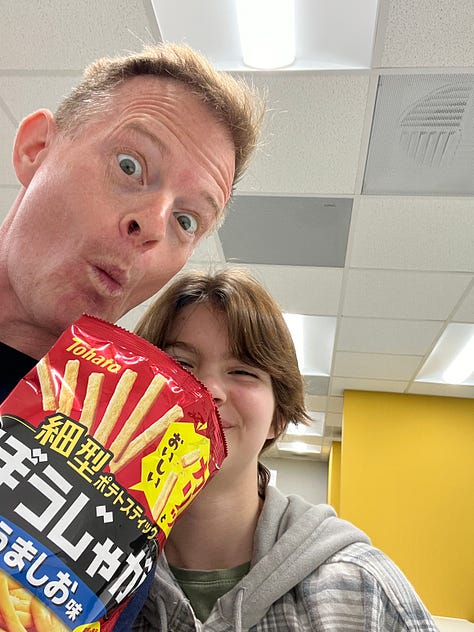
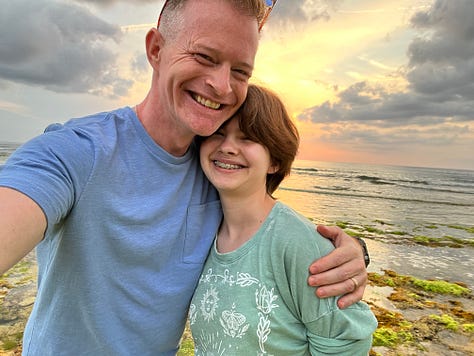
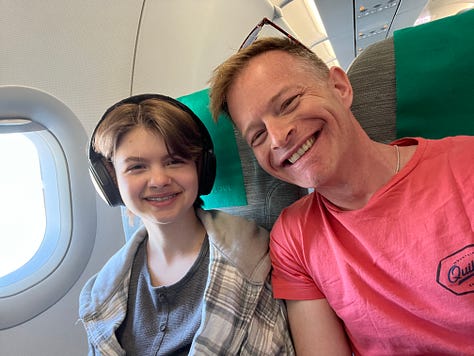
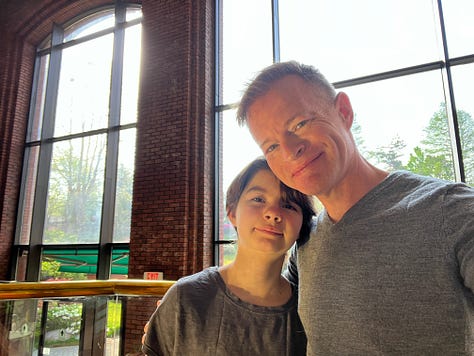
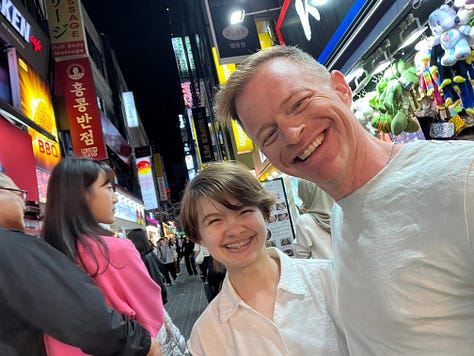
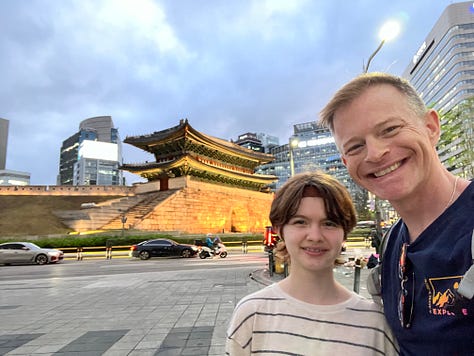
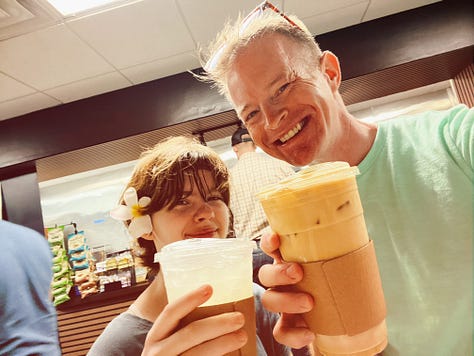
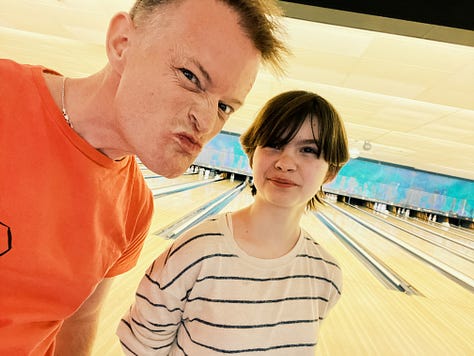
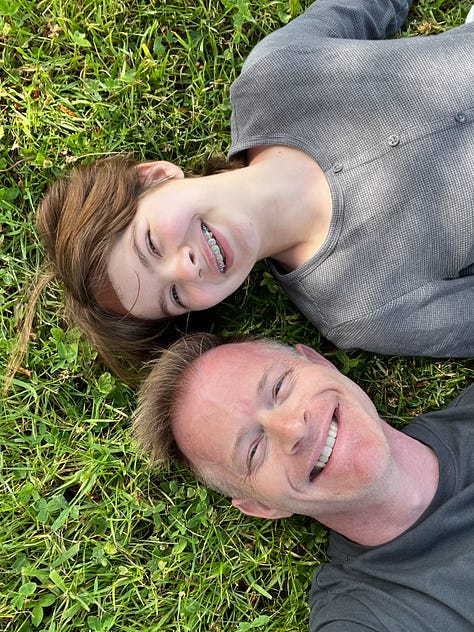
Days of Acceptance
Yesterday, on our third day of delays in Okinawa, we walked along the seaside boardwalk, traversing the concrete barrier that stands as protection against tsunamis. Brilliant green and orange crabs scurried at our approach—side-walking little creatures that look almost like spiders, and yet are, somehow, unmistakably cute.
A few individuals sat quietly along the seawall, books in hand, lost in other worlds. The humid air clung gently to everything. The ocean hissed and splashed in a rhythmic, breath-like cadence. We walked in the early morning air in search of something tasty and new.
We discovered a tiny seaside cafe, barely larger than my living room and kitchen combined. It was a little shop run by four sisters—all in bib overalls, tank tops clinging to sun-kissed skin, their jet-black hair tied up in effortless, messy buns.
Soothing music—John Mayer, Eric Clapton unplugged—drifted from muted speakers in the corner. The interior was all warm wood and brick, the air thick with the smell of bacon, coffee, and something that felt like family.
I placed my order—cash only—and we settled into cushioned chairs around a worn wooden table in the corner.
The café held quiet life:
An aging American, likely left behind after Vietnam.
Two young Japanese women chatting with animated ease.
A solitary spectacled man reading by the window, sunlight spilling in behind him.
We ordered an assortment of deliciousness: pancakes with the most decadent coconut glaze and just the right balance of fluffiness and structure; freshly squeezed tropical fruit juices; and iced smoothies—mango, strawberry, and banana—delivered in tall glasses with wide straws.
But it was the coffee that stole the show.
It arrived in a small, muted green kettle.
Beside it sat a porcelain cup—white on the inside, teal on the outside, resting on a matching saucer. A small chip along the rim revealed its raw edge beneath the glaze.
I poured. Steam rose and curled into the air like incense. I closed my eyes, took a sip… and was instantly transported.
To where?
To a quiet bookstore on a rainy London street in September, with a live guitarist plucking strings in the background.
To a quiet Swiss café in springtime, watching my kids—confident and composed—as they ordered their lunch in French.
To a ski lodge in Virginia, tucked beside a roaring fire, gazing through A-frame windows at blue mountains buried in soft powder.
To all the places where I had tasted coffee this good—each one etched into memory.
Each cup, a touchstone.
These past few days have been long. Even the best travels can wear a person down after crossing thirteen time zones and sleeping in a different bed—or aircraft—every few nights.
But in that moment, with the coffee cup warm in my hand, music threading through the clinks and sizzles of that tiny beachside café, my daughter smiling at me over her strawberry-banana smoothie with shining eyes—
Everything felt exactly right.
I was at peace.
Okinawa had my heart.
And I knew: the next time I tasted coffee this good, I would remember this day.
I said a silent prayer of gratitude as I exited the café in search of whatever came our way for the rest of the day.
Our next opportunity to fly home is in the form of two flights, both leaving tomorrow evening, one to Alaska, one to California. There are plenty of seats available on both. From either destination we can easily hop a commercial flight and be home the day after tomorrow, using frequent flier miles to save a little cash.
Our journey will soon be at an end, we discussed, walking along the boardwalk as a light rain began to descend.
Let’s find whatever adventure—loud or quiet, big or small—this tiny island has to offer us before we depart.
We wound our way through tiny seaside shops and neighborhoods. We relaxed and read quietly in our hotel room. We wandered. We rested.
When dinner came, we visited a conveyor sushi spot—aka, sushi-go-round—one of those delightful places where you sit at a counter, tap your order on a touchscreen, and wait for tiny plates to glide toward you on a moving belt.
There’s something oddly thrilling about it. The soft chime of the screen. The anticipation as your dish rounds the corner. The small, satisfying clink as you pull it from the conveyor and add it to the growing stack of empty plates—a quiet testament to the pleasure of consuming delicious things, one bite at a time. A simple joy.
We spent the evening wandering the streets of another seaside village as rain fell in steady droplets, turning the cobblestone streets into a kaleidoscope of colorful halos reflecting the café lights strung along the boardwalks. We had no destination, nor any expectation. At this point in our journey, we were content simply to walk in the rain.
Another memory.
Another moment.
Walking behind my daughter, watching her skip lightly through the rain—her beautiful hair waving wildly in strands of auburn and deep mahogany—I felt a deep gratitude for the meaning I had found in this past week of delays and setbacks. Viktor was right, of course: we have an astonishing capacity to endure when we choose to give our struggles meaning.
In fact, Nietzsche said something along these same lines—though I hadn’t thought to connect it to Frankl’s quote until just now:
He who has a why to live can bear almost any how.
This journey has shown me things about myself that no therapist or book ever could have. It’s cracked something open in me—my capacity for emotional depth, my willingness to remain vulnerable and share openly from that space. These are sacred lessons, hard-won through pain and internal struggle. But now that I see their value—their meaning—even the unpleasantness of the past week has a kind of beauty to it.
That’s because I’ve come to see that I am not actually powerless, at least not in the traditional sense. I may have no control over when we’ll get home, what my future looks like, or who’s in it. But I do have some power—a lot actually. I have the power to find and make meaning out of this situation.
And this situation—even in its uncertainty, even in its limitation—has meaning. It doesn’t have to be reduced to whether I have an epic photograph to show or a captivating tale to tell.
The growth itself is the point.
What I’ve been experiencing this entire trip is not just an emotional lesson—it’s a mirror that has shown me what kind of life I yearn for: one of connection, depth, honesty, and resonance.
A Soft Ending
So when I sat down to publish this essay this morning, and saw that not one but both of today’s flights were cancelled—with no other flights available until tomorrow—I calmly stood up and walked into the next room, where my daughter was still asleep.
I stood in the doorway and gazed at her face, at rest.
Her hair lay askew across her eyes and forehead.
Her expression held a kind of quiet peace—traces of the infant she once was, mingled with the radiant beauty of the woman she is becoming.
Hey, kiddo. Good morning, I whispered softly.
I waited for her to stir, giving space for sleep to retreat.
She squinted in my direction, and I couldn’t help but smile.
Let’s get some of those yummy coconut pancakes we had yesterday.
Yum, she said, stretching with a squeak.
There she lay. Reaching with outstretched arms to the day, open before us.
Inviting.
Unwritten.
Full of quiet wonder.
About the Author
ES Vorm, PhD, is a father, aviator, scientist, and storyteller, trading a high-powered career in defense research for a slower, more intentional life as a full-time homeschooling dad. A combat veteran with a background in psychology and human-machine teaming, he now writes about healing, parenting, and the quiet courage it takes to build a meaningful life. He believes in learning through lived experience, loving with vulnerability, and finding wonder wherever you are. This series is part of his ongoing journey to become more fully present—in the world and in himself.






